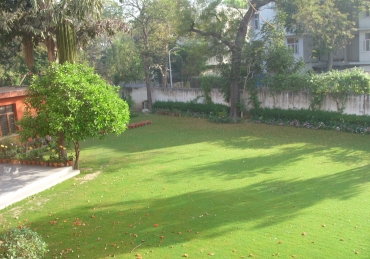Dispute in inheritance
Question
Kindly provide clarification and a suitable solution on the following matter related to estate distribution.
The deceased (Allah have mercy on him) left behind a multifaceted estate to be inherited by his wife, five sons and three daughters. At the time of death, no will was recovered from the various documents left behind. Most aspects of the estate were (relatively) quickly distributed. Property in foreign lands and the main residence in the UK remain outstanding. Since all the children are married and lived separate to their respected parents, it was mutually agreed that the distribution of the main residence be postponed, leaving the wife of the deceased to live in her own space and freedom. This continued until the passing of the wife after a period of sixteen years. It was stipulated that if any of the siblings wished to receive their share of the property, whilst their mother was residing therein, such a request would be honoured.
The property was bought in the 80’s when only the (two) eldest sons were residing in the UK. From what has always been understood (and recognised amongst relations and the wider community), the property belonged to the deceased in whole. Payment was made by the deceased with money supplied from overseas. Supporting living allowances were provided by the deceased to the eldest sons before and after the purchase of the property. It was the case that the shortfall in the purchasing amount was supplemented by the sons by way of savings accrued through employment and the allowances provided by their father over some years.
Upon relocating to the UK, the deceased took up residence at the property with his wife and unmarried children. The sons, who had been residing at the property, purchased their own properties at the time and lived with their own families. Since the deceased was not in the UK at the time of the purchase, the property was purchased in the name of the second son. All legal documents should show this detail. Later, the name of the deceased, his wife and eldest son (who was resident in the UK at the time of purchase) were added to the title deeds. This action was done in 1997.
A few years ago, a will belonging to the deceased was discovered amongst some of his personal artefacts. In a concluding remark, the detail, as described above, is summarised with a statement to the effect, that the property in whole belongs to the deceased whilst title deeds will bear the name of the owner (in name only) as being the second son. The instruction is for the property to be distributed as per Shariah standards and norms. The will is dated 1996, is written in the Gujarati language, bears no witness but is penned by the deceased in his own handwriting as attested to by his children and relatives and as can be verified against other documents.
Unfortunately, after the passing of the wife of the deceased earlier this year, the two sons (who were present at the time of purchase of the property and are the ‘appointed executors’ of their mother’s estate) declared the will as unacceptable, the declaration concerning the ownership of the property as inaccurate, claiming that the property did not belong to their father but was actually purchased by themselves with financial assistance provided by their father. Whilst appearing contradictory, their position is that the remaining siblings will be provided shares from the estate subject to a 30% deduction reflective of the proportional value of the capital they supplied at the time of purchase!
It is claimed the property was purchased for £23,100: £16,170 provided by the deceased, £6,930 jointly by the sons. (Exact sums have not been confirmed or proven).
There is no indication in the will of any money in credit or debt of these amounts: that is, there is no mention that the deceased is left owing of the £6,930 sum to his sons: neither is the will indicative that the sons owe a payment of £16,170 (no such payment has ever been made by the sons) which indicates to the negation of a claim that merely financial assistance was made at the time of purchase. This point is noted here since the will comprehensively and diligently makes comments concerning all aspects related to the estate.
The remaining siblings maintain that the property, in whole, as being that of their father, having received no word to the contrary at any anytime or by anyone until only after the passing of their mother. The two sons making the claim of ownership never made such an announcement prior to the passing of their mother and have never acted as owners (financially and otherwise), even jointly, at any time since the late 80’s.
Is the claim of the two sons valid in this scenario or the understanding of the remaining siblings in light of their father’s will? What is the correct understanding in light of the Quran and Sunnah and the expert Jurists of the Ummah?
بسم الله الرحمن الرحیم
Answer
We have reviewed your detailed query and begin by making three preliminary points before addressing the question.
First, the answer below is based on the representations made in the question. We are not liable for any misrepresentations and factual errors in the question. For this reason, if this answer is shared among the heirs of the deceased, the full document including the question must be shared.
Second, the laws of inheritance are divine and their importance can be understood from the fact that Allah Almighty has outlined them in the Quran detailing the shares heirs are entitled to. This in contrast to other laws such as the laws of Zakat, which are not outlined directly in the Quran with the same level of detail. Thus, when a person passes away, Islam has determined how the wealth of the deceased will be distributed and how much the heirs will be entitled to. These shares are fixed and it is unlawful for any person to interfere in this process or deprive an heir from their right.
Third, the legal owner on a title deed does not necessarily reflect who the owner is from an Islamic perspective, as this is sometimes done for legal or tax purposes.
The question is now addressed. It is clear from the will and the narrative outlined that the house belonged to the deceased father when he passed away. Any counter claim needs to be substantiated with evidences and the question makes no reference to this.
In so far as the financial contribution of the two brothers towards the purchase of the house is concerned, there are three possibilities:
- It was given as a gift to the deceased father. In this scenario, the full house belongs to the deceased father and will be subject to inheritance.
- It was given as a loan to the deceased father. In this scenario, the full house belongs to the deceased father, however, the original loaned amount will be deducted and returned to the two brothers and the remainder will be subject to inheritance.
- The house was jointly purchased by the deceased father and the two brothers with the ownership divided according to their contribution. In this scenario, only the share of the deceased father will be subject to inheritance.
The deceased father’s will indicates towards the first option. If the brothers can substantiate that they loaned the monies to their deceased father, the original loaned amount will be deducted and given to them before the distribution of inheritance.
If ambiguity remains in relation to this amount the brothers gave, we strongly recommend you to consult an expert scholar for arbitration.
Allah knows best
Yusuf Shabbir
19 Muḥarram 1441 / 19 September 2019
Approved by: Mufti Shabbir Ahmad and Mufti Muhammad Tahir







